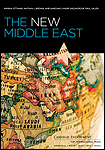Registration
You will receive an email confirming your registration.
Confrontational U.S. policy that tried to create a “New Middle East,” but ignored the realities of the region has instead exacerbated existing conflicts and created new problems, argues The New Middle East, a new report from the Carnegie Endowment. On March 4, 2008, Carnegie experts Marina Ottaway, Nathan J. Brown, Amr Hamzawy, and Karim Sadjadpour discussed their new report during a panel discussion moderated by Carnegie President Jessica T. Mathews.
On March 4, 2008, three of the authors of Carnegie’s New Middle East report—Marina Ottaway, Karim Sadjadpour, and Nathan J. Brown—presented the report’s findings. Ottaway first provided an overview of the report, beginning with the premise that the Bush administration abandoned the longstanding U.S. policy of managing the region to attempt to create a new Middle East. This policy of confrontation is to a large extent responsible for the exacerbation of problems in the region. The U.S. intervention in Iraq broke the previous balance of power in the region: instead of Iraq checking Iran, Iraq has become a failed state, and Iran an opportunistic power asserting its regional hegemony. The U.S. policy of building an anti-Iran coalition with the U.S. at the center cannot work because it ignores the imperative of reestablishing this balance of power. Instead, the United States must recognize that it cannot impose its own solutions on the region and should engage in region-wide diplomacy that includes dealing with Iran.
Sadjadpour offered further policy analysis and recommendations specific to Iran. Since the outset of the Iraq war, U.S. policy has given Iran has an incentive to play an unconstructive role in Iraq, boosted the Iranian regime’s image in contrast to the failed state next door, increased Iran’s asking price for abandoning its nuclear program, and made opposition to the United States a first-tier foreign policy imperative for Iran. As a result, the road to peace in the Middle East now runs through Tehran, rather than Baghdad, and engagement is the only feasible option. Engagement does not imply rewarding the regime with a grand bargain, but should create incentives for Iran to start playing a constructive role in Iraq and elsewhere. Opportunities for engagement will improve in mid-2009, when there will be a new U.S. president and possibly a new Iranian president as well.
Brown assessed the prospects for advancing the Israeli-Palestinian peace process today compared to in 2000. There have been positive developments, namely the widespread acceptance of the legitimacy of a Palestinian state, and majorities on both sides still likely to support a peace agreement if it were on the table. However, both publics are deeply cynical that a deal really is being offered, and there is no viable Palestinian leadership in a position to negotiate on the behalf of all Palestinians. In order to resuscitate the two-state solution Israel and the U.S. must recognize that Hamas is not going away and must make reunifying the Palestinian leadership the top priority.
Brown also presented the report’s findings on the Middle East political reform agenda. The United States must contend with three realities in the region: short-term pressures have overwhelmed long-term ideals, Islamist movements maintain formidable strength, and there are no easy partners for reform in civil society or in political parties. The U.S. must face the fundamental dilemma of supporting the long-term principle of reform while acknowledging these constraints. In guiding future policy, the U.S. should ratchet down its rhetoric, employ a steadier hand toward supporting elections, and focus its efforts on stable societies with authoritarian governments rather than societies in conflict such as Iraq, Palestine, and Lebanon.
In the discussion, the three authors went into further detail about topics including the prospects for a national unity government in Lebanon, opportunities for diplomatic breakthroughs in the Middle East, the Syrian-Iranian relationship, revival of the Middle East peace process, and the implications of U.S. regional diplomacy.
